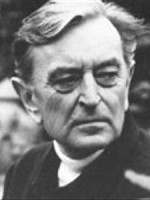William Walton is a Sound and Additional Music British born on 29 march 1902 at Oldham (United-kingdom)

William « Turner » Walton est un compositeur britannique né à Oldham dans le Lancashire (aujourd'hui dans le Grand Manchester) le 29 mars 1902 et mort à Ischia en Italie le 8 mars 1983.
D'abord surnommé « l’enfant terrible de la musique anglaise » à la fois pour son talent et son modernisme, il gagnera une renommée internationale.
William Walton entre à l’âge de dix ans dans l’école des choristes (la maîtrise) de la cathédrale Christ Church d'Oxford, où il restera de 1912 à 1918. Il est ensuite admis au collège Christ Church d'Oxford à l'âge inhabituel de seize ans. Parallèlement, il étudie l'écriture musicale en autodidacte, par la lecture et l'analyse des œuvres de Stravinsky, Debussy, Sibelius et Albert Roussel dont il obtenait les partitions à la bibliothèque, et reçoit les conseils de Hugh Allen, l'organiste de la cathédrale.
En 1919, alors qu’il a tout juste dix-sept ans, il écrit sa première œuvre importante, un quatuor pour piano et cordes, qui sera joué au Festival de la Société internationale de musique contemporaine en 1923.
Durant ces années, il se lie d'amitié avec les poètes Sacheverell Sitwell et Siegfried Sassoon ; lorsqu'il quitte le collège en 1920 sans diplôme, la fratrie Sitwell (Sacheverell, Osbert et Edith) l'héberge dans leur manoir à Chelsea. Edith Sitwell joue alors à Londres un rôle analogue à celui de Jean Cocteau à Paris.
Les Sitwell avaient soutenu leur protégé matériellement et culturellement, lui offrant non seulement un logement, mais aussi
une éducation culturelle stimulante. Walton prit des leçons de musique auprès d'Ernest Ansermet, Ferruccio Busoni et Edward Joseph Dent. Il assista à des représentations des ballets russes, rencontra Stravinsky et Gershwin,
il assista à des représentations de la troupe de danseurs des Savoy Orpheans au Savoy Hotel et écrivit un quatuor expérimental pour cordes sous l'influence de la Seconde Ecole de Vienne, qui fut exécuté à Salzbourg en 1923.
Alban Berg qui assistait au concert fut suffisamment impressionné pour inviter Walton et le présenter à Arnold Schoenberg, son maître et fondateur de la Seconde école de Vienne.
De 1920 à 1930, Walton est à la tête de l’avant-garde musicale au Royaume-Uni.
En 1921, il compose une de ses œuvres majeures, Façade, sur des poèmes d’Edith Sitwell. Créée à Londres en 1923, cette œuvre provoque un véritable scandale car Edith débite ses vers avec un mégaphone, et la musique de Walton semble trop moderne.
En 1926, la Société Internationale de Musique Contemporaine crée son ouverture de concert Portsmouth point à Zurich.
À partir de 1929, Walton connaît la consécration avec des œuvres de maturité prouvant son aptitude à composer de la musique de type classique. En 1929, Paul Hindemith crée son concerto pour alto aux Promenades Concerts de Londres. Son oratorio biblique Belshazzar's feast, composé en 1931, le place dans la lignée des grands maîtres britanniques, de Haendel à Elgar.
À partir de 1937, on le considère comme compositeur officiel du royaume à l’occasion du couronnement du roi George VI, pour lequel il compose Crown Imperial March, puis en 1953, à l’occasion du couronnement d’Élisabeth II, avec son œuvre Orb and Sceptre. En 1939, Jascha Heifetz le sollicite pour écrire un concerto pour violon. Et il compose en 1940 l’ouverture Scapino pour le cinquantième anniversaire de l’Orchestre symphonique de Chicago.
« L’enfant terrible de la musique anglaise » est devenu un illustre compositeur.
Après Guerre
Il épouse en décembre 1948 la fille d'un avocat argentin connue à Buenos Aires, Susana Gil (1926-2010).
Après la guerre, William Walton compose des musiques de films marquantes (on lui devait déjà quelques partitions pour le cinéma dès 1935), pour la trilogie shakespearienne de Laurence Olivier : Henry V en 1944, Hamlet en 1948 et Richard III en 1955. Il aborde l’opéra en 1954 avec Troilus and Cressida, créé à Covent Garden et fréquemment représenté en Grande-Bretagne, sinon ailleurs.
En 1951, il est anobli et devient Sir William Walton et reçoit l'Ordre du Mérite en 1967.
William Walton était fasciné par la guitare, bien que n'étant pas guitariste lui-même. L'idée de composer pour cet instrument se fait jour en lui, et il compose Cinq bagatelles pour guitare. Pour ce faire, il avait décidé de consulter le guitariste renommé Julian Bream dans tout le processus de composition afin de faire de ces Bagatelles les chefs-d'œuvre idiomatiques de guitare qu'ils sont aujourd'hui. Combinées, la créativité sans limites d'un compositeur et la participation active d'un guitariste d'exception étaient cruciales pour donner à ces morceaux leur caractère unique et beau, reconnu et salué par l'ensemble des critiques musicaux.
Les Cinq Bagatelles ont donc été écrites pour Julian Bream, qui en sera l'éditeur officiel, et leur première exécution sera faite le 27 mai 1972. Walton sera alors reconnu par l'ensemble du monde de la guitare comme l'un des plus grands compositeurs vivants ayant jamais composé pour cet instrument.
Il passe les dernières années de sa vie sur l’île d’Ischia avec sa femme Susana, tous deux isolés du reste du monde, dans un décor paradisiaque de végétation subtropicale. Cette propriété est devenue un lieu d’études et d’archives pour jeunes musiciens.
Sur un rocher où reposent ses cendres, Susana Walton a fait inscrire la citation de Thomas Traherne :
« Toute félicité consiste à faire ce que faisait Adam. »
En résumé, on pourrait dire que Sir Walton était un moderniste avec un cheminement artistique en marge des circuits traditionnels. Il est resté attaché aux formes classiques, particulièrement dans ses œuvres symphoniques héritées de la grande tradition romantique. Son œuvre est avant tout nationale et profondément britannique.
Les jardins de La Mortella
C'est à Zaro, hameau de Forio (île d'Ischia) que Walton va créer avec son épouse argentine Lady Susana (1926-2010) et le célèbre architecte paysagiste Russell Page dès 1956 la Villa Walton avec les jardins La Mortella et ceci sur un aride pierrier, résultat d'une coulée de lave de l'Époméo qui ravagea un versant et forma la Pointe Caruso. Le jardin se répand sur environ 2 hectares.
La Mortella est divisée en un jardin inférieur (The Valley) et un jardin supérieur sur la colline, en terrasses. Un réseau de promenades, de chemins, de rampes et de marches permettant aux visiteurs d'atteindre la colline supérieure, où ils ont une vue imprenable sur la baie de Forio.
Le jardin dispose d'une importante collection de plantes exotiques rares. La diversité et la richesse de la collection est telle que La Mortella peut être considéré comme un jardin botanique. L'omniprésence d'eau par les fontaines, les étangs ou les cours d'eau permet la culture d'un éventail de plantes acquaphiles tels le papyrus, le lotus et des nénuphars tropicaux. Trois serres tropicales complètent l'ensemble : la Chambre Victoria, la Chambre des Orchidées et le temple du Soleil. Citons encore la Maison Thai, un endroit calme de méditation entouré d'un jardin oriental, avec lotus, pivoines, bambous et érables orientaux; la cascade du Crocodile, alimentée par un ruisseau au milieu des oliviers et des agapanthes; le Nymphée, émergence de maquis méditerranéen; le Rocher de William où les cendres du compositeur sont conservées.
Il a été incinéré et ses cendres enterrées dans son jardin à Ischia.
Source : Wikidata
William Walton

- Infos
- Photos
- Best films
- Family
- Characters
- Awards
Nationality United-kingdom
Birth 29 march 1902 at Oldham (United-kingdom)
Death 8 march 1983 (at 80 years) at Ischia (Italie)
Birth 29 march 1902 at Oldham (United-kingdom)
Death 8 march 1983 (at 80 years) at Ischia (Italie)
D'abord surnommé « l’enfant terrible de la musique anglaise » à la fois pour son talent et son modernisme, il gagnera une renommée internationale.
Biography
Jeunesse et ascensionWilliam Walton entre à l’âge de dix ans dans l’école des choristes (la maîtrise) de la cathédrale Christ Church d'Oxford, où il restera de 1912 à 1918. Il est ensuite admis au collège Christ Church d'Oxford à l'âge inhabituel de seize ans. Parallèlement, il étudie l'écriture musicale en autodidacte, par la lecture et l'analyse des œuvres de Stravinsky, Debussy, Sibelius et Albert Roussel dont il obtenait les partitions à la bibliothèque, et reçoit les conseils de Hugh Allen, l'organiste de la cathédrale.
En 1919, alors qu’il a tout juste dix-sept ans, il écrit sa première œuvre importante, un quatuor pour piano et cordes, qui sera joué au Festival de la Société internationale de musique contemporaine en 1923.
Durant ces années, il se lie d'amitié avec les poètes Sacheverell Sitwell et Siegfried Sassoon ; lorsqu'il quitte le collège en 1920 sans diplôme, la fratrie Sitwell (Sacheverell, Osbert et Edith) l'héberge dans leur manoir à Chelsea. Edith Sitwell joue alors à Londres un rôle analogue à celui de Jean Cocteau à Paris.
Les Sitwell avaient soutenu leur protégé matériellement et culturellement, lui offrant non seulement un logement, mais aussi
une éducation culturelle stimulante. Walton prit des leçons de musique auprès d'Ernest Ansermet, Ferruccio Busoni et Edward Joseph Dent. Il assista à des représentations des ballets russes, rencontra Stravinsky et Gershwin,
il assista à des représentations de la troupe de danseurs des Savoy Orpheans au Savoy Hotel et écrivit un quatuor expérimental pour cordes sous l'influence de la Seconde Ecole de Vienne, qui fut exécuté à Salzbourg en 1923.
Alban Berg qui assistait au concert fut suffisamment impressionné pour inviter Walton et le présenter à Arnold Schoenberg, son maître et fondateur de la Seconde école de Vienne.
De 1920 à 1930, Walton est à la tête de l’avant-garde musicale au Royaume-Uni.
En 1921, il compose une de ses œuvres majeures, Façade, sur des poèmes d’Edith Sitwell. Créée à Londres en 1923, cette œuvre provoque un véritable scandale car Edith débite ses vers avec un mégaphone, et la musique de Walton semble trop moderne.
En 1926, la Société Internationale de Musique Contemporaine crée son ouverture de concert Portsmouth point à Zurich.
À partir de 1929, Walton connaît la consécration avec des œuvres de maturité prouvant son aptitude à composer de la musique de type classique. En 1929, Paul Hindemith crée son concerto pour alto aux Promenades Concerts de Londres. Son oratorio biblique Belshazzar's feast, composé en 1931, le place dans la lignée des grands maîtres britanniques, de Haendel à Elgar.
À partir de 1937, on le considère comme compositeur officiel du royaume à l’occasion du couronnement du roi George VI, pour lequel il compose Crown Imperial March, puis en 1953, à l’occasion du couronnement d’Élisabeth II, avec son œuvre Orb and Sceptre. En 1939, Jascha Heifetz le sollicite pour écrire un concerto pour violon. Et il compose en 1940 l’ouverture Scapino pour le cinquantième anniversaire de l’Orchestre symphonique de Chicago.
« L’enfant terrible de la musique anglaise » est devenu un illustre compositeur.
Après Guerre
Il épouse en décembre 1948 la fille d'un avocat argentin connue à Buenos Aires, Susana Gil (1926-2010).
Après la guerre, William Walton compose des musiques de films marquantes (on lui devait déjà quelques partitions pour le cinéma dès 1935), pour la trilogie shakespearienne de Laurence Olivier : Henry V en 1944, Hamlet en 1948 et Richard III en 1955. Il aborde l’opéra en 1954 avec Troilus and Cressida, créé à Covent Garden et fréquemment représenté en Grande-Bretagne, sinon ailleurs.
En 1951, il est anobli et devient Sir William Walton et reçoit l'Ordre du Mérite en 1967.
William Walton était fasciné par la guitare, bien que n'étant pas guitariste lui-même. L'idée de composer pour cet instrument se fait jour en lui, et il compose Cinq bagatelles pour guitare. Pour ce faire, il avait décidé de consulter le guitariste renommé Julian Bream dans tout le processus de composition afin de faire de ces Bagatelles les chefs-d'œuvre idiomatiques de guitare qu'ils sont aujourd'hui. Combinées, la créativité sans limites d'un compositeur et la participation active d'un guitariste d'exception étaient cruciales pour donner à ces morceaux leur caractère unique et beau, reconnu et salué par l'ensemble des critiques musicaux.
Les Cinq Bagatelles ont donc été écrites pour Julian Bream, qui en sera l'éditeur officiel, et leur première exécution sera faite le 27 mai 1972. Walton sera alors reconnu par l'ensemble du monde de la guitare comme l'un des plus grands compositeurs vivants ayant jamais composé pour cet instrument.
Il passe les dernières années de sa vie sur l’île d’Ischia avec sa femme Susana, tous deux isolés du reste du monde, dans un décor paradisiaque de végétation subtropicale. Cette propriété est devenue un lieu d’études et d’archives pour jeunes musiciens.
Sur un rocher où reposent ses cendres, Susana Walton a fait inscrire la citation de Thomas Traherne :
« Toute félicité consiste à faire ce que faisait Adam. »
En résumé, on pourrait dire que Sir Walton était un moderniste avec un cheminement artistique en marge des circuits traditionnels. Il est resté attaché aux formes classiques, particulièrement dans ses œuvres symphoniques héritées de la grande tradition romantique. Son œuvre est avant tout nationale et profondément britannique.
Les jardins de La Mortella
C'est à Zaro, hameau de Forio (île d'Ischia) que Walton va créer avec son épouse argentine Lady Susana (1926-2010) et le célèbre architecte paysagiste Russell Page dès 1956 la Villa Walton avec les jardins La Mortella et ceci sur un aride pierrier, résultat d'une coulée de lave de l'Époméo qui ravagea un versant et forma la Pointe Caruso. Le jardin se répand sur environ 2 hectares.
La Mortella est divisée en un jardin inférieur (The Valley) et un jardin supérieur sur la colline, en terrasses. Un réseau de promenades, de chemins, de rampes et de marches permettant aux visiteurs d'atteindre la colline supérieure, où ils ont une vue imprenable sur la baie de Forio.
Le jardin dispose d'une importante collection de plantes exotiques rares. La diversité et la richesse de la collection est telle que La Mortella peut être considéré comme un jardin botanique. L'omniprésence d'eau par les fontaines, les étangs ou les cours d'eau permet la culture d'un éventail de plantes acquaphiles tels le papyrus, le lotus et des nénuphars tropicaux. Trois serres tropicales complètent l'ensemble : la Chambre Victoria, la Chambre des Orchidées et le temple du Soleil. Citons encore la Maison Thai, un endroit calme de méditation entouré d'un jardin oriental, avec lotus, pivoines, bambous et érables orientaux; la cascade du Crocodile, alimentée par un ruisseau au milieu des oliviers et des agapanthes; le Nymphée, émergence de maquis méditerranéen; le Rocher de William où les cendres du compositeur sont conservées.
Il a été incinéré et ses cendres enterrées dans son jardin à Ischia.
Best films
Usually with
Filmography of William Walton (14 films)
Sound
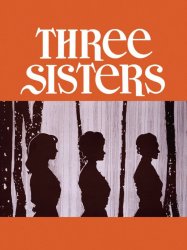
Three Sisters (1970)
, 2h45Directed by Laurence Olivier, John Sichel
Origin United-kingdom
Genres Drama
Themes Films about families, Films based on plays
Actors Alan Bates, Laurence Olivier, Joan Plowright, Derek Jacobi, Sheila Reid, Daphne Heard
Roles Original Music Composer
Rating61%





Au début du XXe siècle, trois soeurs orphelines de père rêvent de quitter la Russie provinciale pour aller vivre en ville.

Battle of Britain (1969)
, 2h31Directed by Guy Hamilton
Origin United-kingdom
Genres Drama, War, Action, Historical
Themes Transport films, Aviation films, Political films, Disaster films, Films about aviation accidents or incidents
Actors Harry Andrews, Laurence Olivier, Trevor Howard, Robert Shaw, Christopher Plummer, Michael Caine
Rating68%





In the Battle of France in June 1940, RAF pilots evacuate a small airfield in advance of the German Blitzkrieg. The pilots, along with British and French military, leave just as German aircraft arrive and execute a heavy strafing attack. RAF Air Chief Marshal Hugh Dowding (Laurence Olivier), realising that an imminent invasion of Great Britain will require every available aircraft and airman to counter it, stops additional aircraft being deployed to France so that they are available to defend Britain. In the next dramatic scene, French civilians watch in awe as a convoy of German troops march into France and take control.

Richard III (1955)
, 2h41Directed by Laurence Olivier
Origin United-kingdom
Genres Drama, Historical
Themes Théâtre, Political films, Films based on plays, Films based on works by William Shakespeare, Films about royalty
Actors Laurence Olivier, Ralph Richardson, Claire Bloom, Cedric Hardwicke, John Gielgud, Laurence Naismith
Roles Original Music Composer
Rating72%





King Edward IV of England (Sir Cedric Hardwicke) has been placed on the throne with the help of his brother, Richard, Duke of Gloucester (Sir Laurence Olivier). After Edward's coronation in the Great Hall with his brothers George and Richard watching, he leaves with his son. Richard contemplates the throne, before advancing towards the audience and then addressing them, delivering a speech that outlines his physical deformities, including a hunched back and a withered arm. He goes on to describe his jealousy over his brother's rise to power in contrast to his lowly position.

Hamlet (1948)
, 2h35Directed by Laurence Olivier
Origin United-kingdom
Genres Drama
Themes Films about families, Théâtre, Political films, Films based on plays, Films based on works by William Shakespeare, Films about royalty
Actors Laurence Olivier, Basil Sydney, Eileen Herlie, Jean Simmons, Peter Cushing, Stanley Holloway
Roles Original Music Composer
Rating75%





The film follows the overall story of the play, but cuts nearly half the dialogue, leaves out two major characters.

Henry V (1944)
, 2h17Directed by Laurence Olivier, John Paddy Carstairs
Origin United-kingdom
Genres Drama, War, Action, Historical
Themes Théâtre, Political films, Films based on plays, Films based on works by William Shakespeare, Films about royalty
Actors Laurence Olivier, Renée Asherson, Ralph Truman, Robert Helpmann, Robert Newton, Leslie Banks
Roles Original Music Composer
Rating69%





We see a panorama of London in 1600 and travel to the Globe Theatre where the audience is being seated. The Chorus (Leslie Banks) enters and implores the audience to use their imagination to visualise the setting of the play. We then see, up on a balcony, two clergymen, The Archbishop of Canterbury (Felix Aylmer), and the Bishop of Ely (Robert Helpmann) discussing the current affairs of state. Henry (Laurence Olivier) then enters, and discusses with his nobles the state of France. A gift is delivered to Henry from the French Dauphin. The gift turns out to be tennis balls, a jibe at Henry's youth and inexperience. Offended, Henry sends the French ambassador away, and prepares to claim the French throne, a throne that he believes is rightfully his.

The Foreman Went to France (1942)
, 1h27Directed by Charles Frend
Origin United-kingdom
Genres Drama, War
Themes Political films
Actors Clifford Evans, Robert Morley, Constance Cummings, Tommy Trinder, Gordon Jackson, John Williams
Roles Original Music Composer
Rating68%





English factory foreman Fred Carrick (Clifford Evans) goes to France on his own initiative to retrieve several pieces of valuable machinery ahead of the German invasion. Along the way, he is helped by two soldiers (Tommy Trinder, Gordon Jackson) and an American woman (Constance Cummings). To get to France, Fred has to get round the opposition of his firm's bosses and British civil servants. While in France, he has to learn about the role of the fifth column. His gradual realisation of how authority can trick him has been argued to be an allegory to Britain learning not to be to be too trusting but also through the role of an Anne Stafford, an American woman, an anticipation of an eventual alliance with the United States. During the race to the coast with the machines, the film evokes the huge scale of the refugee movements that fled before the advancing Nazis in France in 1940.

Went the Day Well? (1942)
, 1h32Directed by Alberto Cavalcanti
Origin United-kingdom
Genres War, Thriller
Themes Seafaring films, Politique, Transport films, La bataille de l'Atlantique, Documentary films about war, Documentary films about historical events, Political films, Documentary films about World War II
Actors Leslie Banks, Elizabeth Allan, Mervyn Johns, Basil Sydney, C.V. France, Marie Lohr
Roles Original Music Composer
Rating74%





The story is told in flashback by a villager, played by Mervyn Johns, as though to a person visiting after the war. He recounts: one Saturday during the Second World War, a group of seemingly authentic British soldiers arrive in the small, fictitious English village of Bramley End. It is the Whitsun weekend so life is even quieter than usual and there is almost no traffic of any kind. At first they are welcomed by the villagers, until doubts begin to grow about their true purpose and identity. After they are revealed to be German soldiers intended to form the vanguard of an invasion of Britain, they round up the residents and hold them captive in the local church. The vicar is shot after sounding the church bell in alarm.
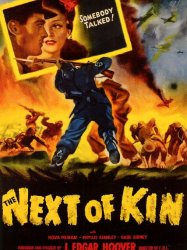
The Next of Kin (1942)
, 1h42Directed by Thorold Dickinson
Origin United-kingdom
Genres Drama, War, Thriller, Action
Themes Documentary films about war, Documentary films about historical events, Political films, Documentary films about World War II
Actors Mervyn Johns, Nova Pilbeam, John Chandos, Jack Hawkins, Reginald Tate, Basil Sydney
Roles Original Music Composer
Rating67%





The British army is preparing an attack on a German-held French port. German intelligence use agents in England to discover the intended target by piecing together information from different sources, including conversations overheard in pubs, railway stations, shops and other public places.

The First of the Few (1942)
, 1h58Directed by Leslie Howard, George Pollock
Origin United-kingdom
Genres Drama, War, Biography, Historical
Themes Transport films, Aviation films, Political films
Actors Leslie Howard, David Niven, Rosamund John, Roland Culver, Anne Firth, David Horne
Roles Original Music Composer
Rating69%





A newsreel sets the scene for summer 1940, showing Nazi advances in Europe with Britain facing invasion and aerial attacks on the island increasing. On 15 September 1940, during the Battle of Britain, RAF Squadron Leader Geoffrey Crisp (David Niven), the station commander of a Spitfire squadron, recounts the story of how his friend, R.J. Mitchell (Leslie Howard) designed the Spitfire fighter. His pilots listen as Crisp begins with the 1922 Schneider Trophy competition, where Mitchell began his most important work, designing high speed aircraft. While watching seagulls with his binoculars, he envisages a new shape for aircraft in the future. Crisp, an ex-First World War pilot seeking work, captivates Mitchell with his enthusiasm and the designer promises to hire him as test pilot should his design ever go into production. Facing opposition from official sources, Mitchell succeeds in creating a series of highly successful seaplane racers, eventually winning the Schneider Trophy outright for Great Britain.
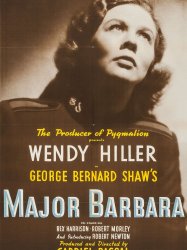
Major Barbara (1941)
, 2h11Directed by David Lean, Harold French, Gabriel Pascal
Origin United-kingdom
Genres Comedy
Themes Films based on plays
Actors Wendy Hiller, Rex Harrison, Robert Morley, Robert Newton, Sybil Thorndike, Emlyn Williams
Roles Original Music Composer
Rating67%





In this social satire, Barbara Undershaft (Hiller), an idealistic major in the Salvation Army, is deeply troubled by the fact that her father, Andrew Undershaft (Robert Morley), is a wealthy weapons manufacturer. Meanwhile, Andrew is looking for an heir for his industrial empire, in particular a foundling like himself.

Stolen Life (1939)
Directed by Paul Czinner
Genres Drama
Actors Elisabeth Bergner, Michael Redgrave, Wilfrid Lawson, Richard Ainley, Daniel Mendaille, Stella Arbenina
Roles Original Music Composer
Rating67%






Dreaming Lips (1937)
, 1h34Directed by Lee Garmes, Paul Czinner
Origin United-kingdom
Genres Drama
Actors Elisabeth Bergner, Raymond Massey, Romney Brent, Joyce Bland, Felix Aylmer, J. Fisher White
Roles Original Music Composer
Rating57%





The wife (Bergner) of a violin player (Brent) in a famous orchestra, falls in love with her husband's friend and, tragically, drowns herself.
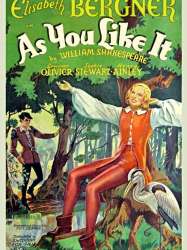
As You Like It (1936)
, 1h36Directed by Joseph Schenck, Paul Czinner
Origin United-kingdom
Genres Drama, Comedy, Romantic comedy, Romance
Themes Théâtre, Films based on plays, Films based on works by William Shakespeare, Children's films
Actors Laurence Olivier, Elisabeth Bergner, Felix Aylmer, John Laurie, Henry Ainley, Austin Trevor
Roles Original Music Composer
Rating58%





Duke Frederick (Felix Aylmer) has usurped and deposed his older brother, Duke Senior (Henry Ainley). Frederick allows the exiled Duke's daughter, Rosalind (Elisabeth Bergner), however, to stay, as she is the closest friend of his daughter, Celia (Sophie Stewart). Orlando (Laurence Olivier), who has been forced to flee his home due to the oppression from his brother, Oliver (John Laurie), comes to the Frederick's Duchy, and enters a wrestling tournament. On leaving the Duchy, Orlando encounters Rosalind, and it is love at first sight. Frederick then becomes angry, and banishes Rosalind. Celia decides to accompany her, along with a jester, Touchstone (Mackenzie Ward).
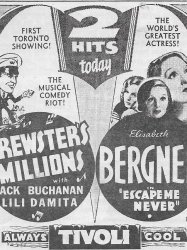
Escape Me Never (1935)
, 1h35Directed by Paul Czinner
Origin United-kingdom
Genres Drama
Themes Films based on plays
Actors Elisabeth Bergner, Griffith Jones, Hugh Sinclair, Penelope Dudley-Ward, Rosalinde Fuller, Victor Rietti
Roles Original Music Composer
Rating55%





Team

Battle of Britain (1969)
, 2h31Directed by Guy Hamilton
Origin United-kingdom
Genres Drama, War, Action, Historical
Themes Transport films, Aviation films, Political films, Disaster films, Films about aviation accidents or incidents
Actors Harry Andrews, Laurence Olivier, Trevor Howard, Robert Shaw, Christopher Plummer, Michael Caine
Roles Additional Music
Rating68%





In the Battle of France in June 1940, RAF pilots evacuate a small airfield in advance of the German Blitzkrieg. The pilots, along with British and French military, leave just as German aircraft arrive and execute a heavy strafing attack. RAF Air Chief Marshal Hugh Dowding (Laurence Olivier), realising that an imminent invasion of Great Britain will require every available aircraft and airman to counter it, stops additional aircraft being deployed to France so that they are available to defend Britain. In the next dramatic scene, French civilians watch in awe as a convoy of German troops march into France and take control.
 Connection
Connection


